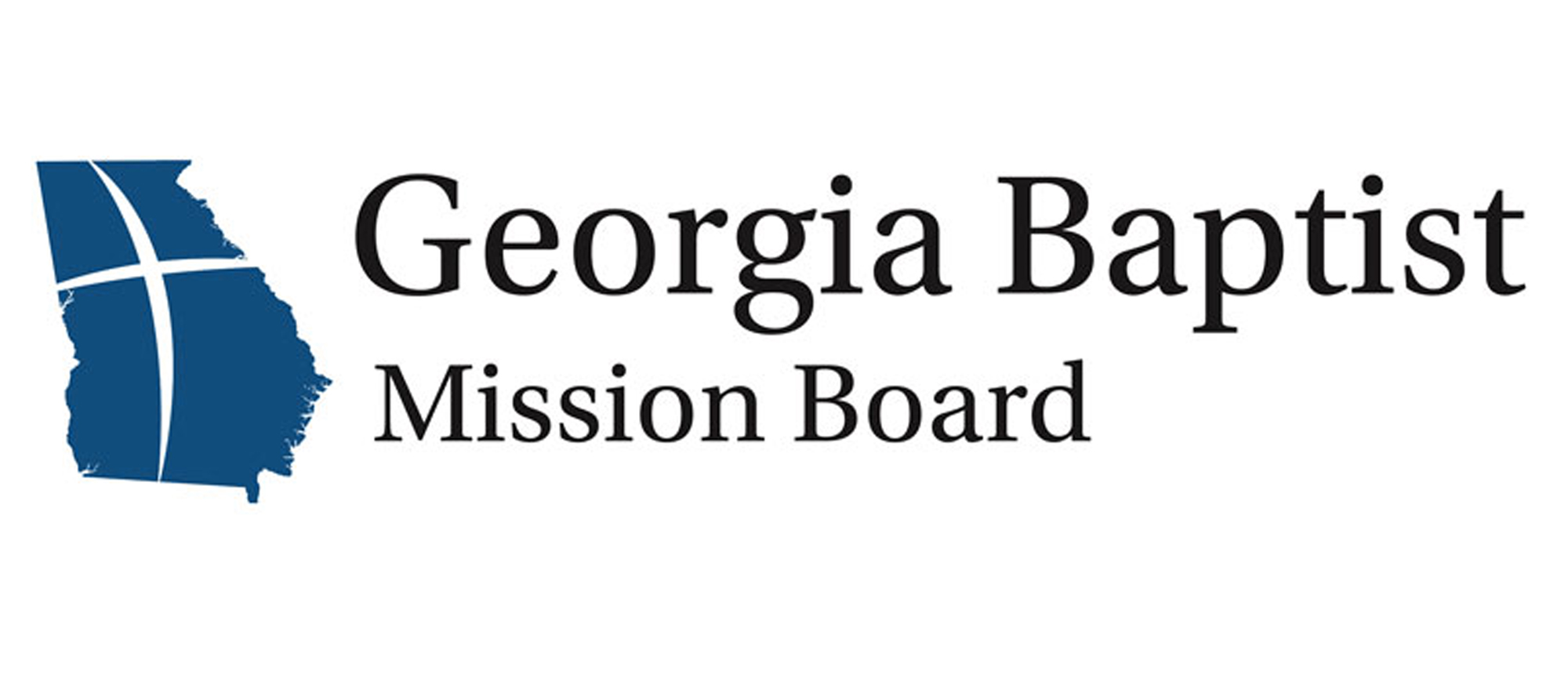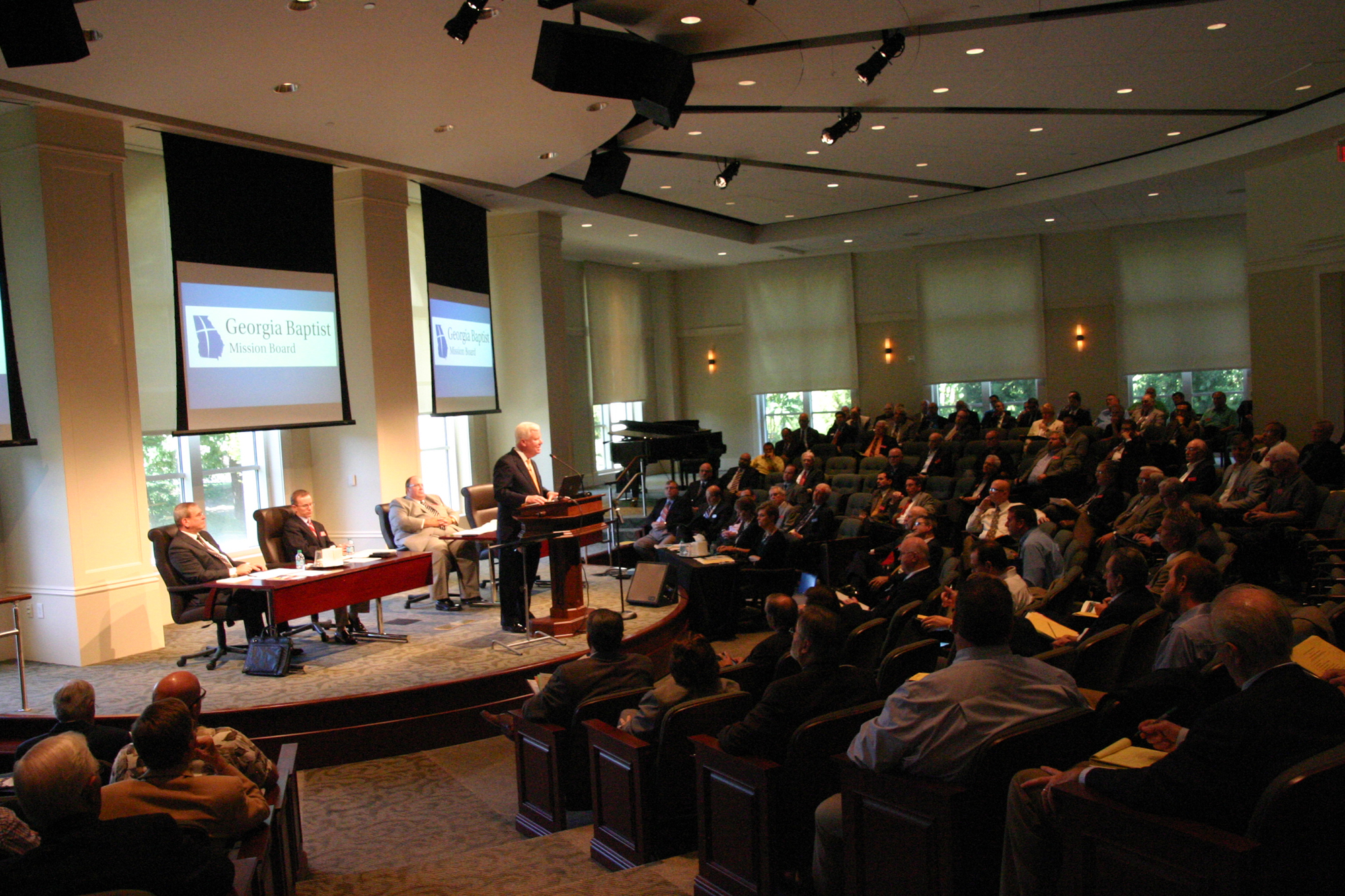
DULUTH, Ga. (BP) — Georgia Baptists have announced they are reinventing themselves with a new focus, new organizational structure, and new name that better communicates their mission and identity. The new direction was rolled out to state missionaries Monday (Sept. 14) at the Baptist Missions and Ministry Center in Duluth and shared with the Georgia Baptist Executive Committee today (Sept. 15).
The focus emerged after nearly a year of study that centers around eight objectives ranging from involving the next generation to better equipping churches and mobilizing people to be more involved in ministry and financial support. The objectives include:
— Ministry that compels the next generation to be engaged;
— Ministry that strengthens churches and church leaders;
— Ministry that puts more resources into connecting children and teens;
— Ministry that results in more Gospel proclamation and salvations;
— Ministry that brings ethnic churches and leaders into leadership and full participation;
— Ministry that directly supports the priorities of the Five Smooth Stones (the state convention’s strategy for reaching more of the unchurched: spiritual renewal, Kingdom generosity, church revitalization, church planting and authentic evangelism);
— Ministry that mobilizes people to personally engage in missions;
— Ministry that compels people to want to give more financially.
Name change affirms clear identity
 Perhaps the most significant development is changing the name from the Georgia Baptist Convention to the Georgia Baptist Mission Board (GBMB).
Perhaps the most significant development is changing the name from the Georgia Baptist Convention to the Georgia Baptist Mission Board (GBMB).
“We operate under two names. Our corporate name, according to our 1830 charter, is The Executive Committee of the Baptist Convention of the State of Georgia. But we are known more commonly as the Georgia Baptist Convention,” Executive Director J. Robert White explained to both groups.
Technically, the Georgia Baptist Convention only exists for two days when messengers gather to conduct business each November. Neither the corporate name or the Georgia Baptist Convention name do an adequate job of explaining what the state convention actually does, White explained.
That identity was then crystalized in one sentence: “We are a missionary sending agency in Georgia.”
White noted the agency performs its mission calling “by spreading the Gospel of Christ in a state that is at least 70 percent lost. We are functioning as a state mission board, though we have not in recent years expressed that in our name.”
He stated the Georgia Baptist Mission Board “more clearly identifies who we are and what we do.”
White stated the commitment to reinvention was based on three major emphases, namely commitment to:
— global missions support;
— Georgia church services and Georgia church planting partnerships; and
— Georgia community evangelism and missions.
White then gave a brief history lesson, explaining the precedent for the name. He then referred to page 27 of the May 15, 1919 issue of The Christian Index which reported “in 1879 a resolution was passed, changing the name from the State Mission Committee” to “The Board of Missions of the State of Georgia …”
He then noted the new name will be the undergirding strength behind all the agency does in pushing back spiritual darkness in Georgia, and in its missions ventures throughout North America and around the world. The multi-faceted agency will be reinvented around a variety of innovative approaches to missions and evangelism:
Field based personnel
The GBMB will move toward field-based personnel, employees and practitioners in local churches. The move will bring the agency closer to the churches without adding staff positions.
“We are already electronically connected and we could gather Baptist Missions and Ministry Center staff as needed in alternate locations, most likely in gathering hosted by churches,” he said.
In this scenario the agency will contract with experienced church staff members and laity who will extend the Board’s ministry with minimal overhead. These individuals will work alongside state missionaries to perform ministry close to where the need is identified. A suggested contract would be $1,000 a month for 12 months or less.
“From an economical perspective I’m sure some added income would be well received by such practitioners and it would save Cooperative Program dollars for other ministries,” White explained.
Reduced need for building space
With more employees disbursed across the state there would be less demand for the current headquarters building, which could be sold at a premium from its original construction cost. The sale of the property would then free the Board to purchase a much smaller facility to primarily house administrative staff.
The Baptist Missions and Ministry Center, which sits on a 43-acre tract on Sugarloaf Parkway in the heart of Gwinnett County, was dedicated on Sept. 12, 2006. The $42-million project — $23 million for the building, $10 million for the land, and $9 million for technological innovations — could be sold at a premium in a location that is seeing a steady rise in property values, White noted.
Proceeds from the sale could be invested with the Georgia Baptist Foundation to provide endowment for ministry for decades to come.
The building’s $25-million debt was retired in March 2015 through a gift of the Georgia Baptist Health Care Ministry Foundation.
Partnering of the Christian Index with communications ministries
Due to common job skills between The Index and communications — primarily writers, graphic designers, photography and social media — the two offices will work far more closely together rather than adding staff. Cross-training has already begun between the two work units.
As part of this move The Index Board of Directors recently voted to disband in order to streamline The Index’s administrative overhead. As a result the newspaper has become a ministry area similar to other departments.
An additional part of reinventing the state convention resulted in The Index announcing earlier this month that it would move to a primarily online presence on Jan. 1, 2016. See related story. That decision, based on declining advertising and subscription income, will save nearly $320,000 annually in Cooperative Program dollars.
Merger of Sunday School/small groups and discipleship ministries
This new ministry area will more closely resemble where churches are heading in their organizational structure and will be focused on groups and faith development.
There will be three areas of ministry in the work unit that will be known as Groups and Faith Development Ministries and will be based on life stages:
— Preschool and Children’s Groups & Faith Development Ministry;
— Youth Groups and Faith Development Ministry;
— Adult Groups and Faith Development Ministry, consisting of young adults, median adults and senior adults.
An example of the need for the new work unit is the nearly 2,700 churches out of 3,600 that have no vocational youth pastors. Such congregations will benefit from specialized assistance from the state missionaries.
Two new departments to serve churches
Two new ministry areas will be created to meet emerging needs.
Georgia Community Missions and Disaster Response will include disaster relief, chaplaincy ministries, community missions and mobile home and apartment missions.
Three areas — crisis pregnancy, human trafficking and public affairs — will relate to the Executive Office.
Church Administration Ministry will offer practical assistance to many small churches seeking help with administrative needs such as:
— buildings and grounds;
— budgets/money management;
— church constitution/bylaws;
— parliamentary procedure;
— child protection; and
— personnel issues/human resources.
“We have never offered these services and they will make a tremendous impact on the health and viability of many of our churches,” White noted.
Strengthening ministries and planting churches
The GBMB will seek to avoid duplication between its ministries and local churches and strengthen successful ministries by partnering with churches and associations in existing events.
Speaking of the GBMB’s intention to expand church planting, White stated that it will use existing statewide agency properties, such as Baptist Campus Ministry centers, to plant campus churches.
Reduction in administration committee schedule
To further save Cooperative Program dollars and place more funds on the field, the Administration Committee will be reduced from 10 to four meetings, with additional meetings electronically, if needed. This will result in a savings of $12,504.
The Georgia Baptist Executive Committee schedule will remain the same with four annual meetings. With the possible sale of the headquarters building, the Executive Committee could meet in churches to further save overhead costs.
New operation schedule for Missions and Ministry Center
To further reduce costs and place state missionaries closer to churches, a revised office schedule for the headquarters building will be implemented. The building will be open Monday through Thursday and closed on Friday. A call center will route calls to the appropriate office on Friday, with churches or associations receiving a return call within minutes from the state missionary.
The new schedule will primarily affect support staff who will remain available remotely.
“This does not mean state missionaries will not work on Fridays, it just means they will not work from the Missions and Ministry Center on Fridays. They will work remotely, whether from their home or from the field assisting churches as any other day of the week,” White commented.
He stressed built-in accountability was part of the Friday schedule and any callers would receive an immediate return call from the state missionary being sought.
One of the reasons for closing the building one day a week is that Friday has the lowest call volume from churches and associational offices since many close on that day. Cooperative Program dollars will also be saved from no longer heating and cooling the Missions and Ministry Center for a small administrative staff.
The reinvention will be rolled out over two years, beginning on Jan. 1, 2016 and being fully implemented by December 31, 2017, White added.
The reorganization is the first since the agency underwent a major overhaul in 1997 and in 2011 when Five Smooth Stones was adopted and became the new direction for the work.
















